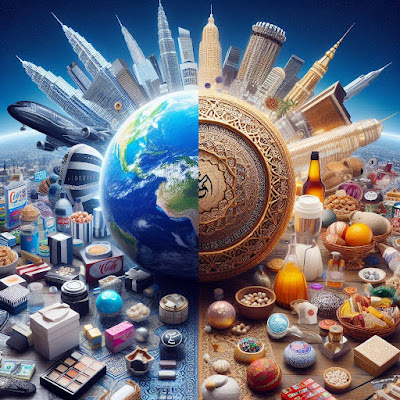Supporting Islamic Economies Over Global Name Brands: Reclaiming Our Economic Power
Shift from mass-produced, Western-driven fashion to ethical, culturally-rooted Islamic economic support.
In the era of global consumerism, our purchasing decisions often reflect more than just personal taste. They represent our values, our ethics, and our connection to the world around us. One of the most significant shifts we can make, especially as Muslims, is moving away from supporting global name brands and instead investing in Islamic economies that prioritize fairness, sustainability, and community well-being.
Supporting Islamic Economies: The Ethical and Spiritual Choice Over Name Brands
In today's world, many of us find ourselves caught up in the allure of name-brand products — from clothing to accessories and even technology. These brands often represent a symbol of status, luxury, and modernity. However, when we stop and reflect, it becomes clear that many of these global corporations are part of a broader system that doesn't align with our values, whether it's their business practices, labor conditions, or cultural impact. As Muslims, the question we should ask is: Are we supporting an economy that benefits us, our communities, and our faith?
The Shift from Consumerism to Supporting Ethical, Islamic Economies
In the modern world, it's hard to escape the influence of global consumer culture, and name-brand products often become a symbol of prestige. However, there’s an urgent need to reflect on where our money is going and whether it's contributing to something that aligns with our faith, our values, and the betterment of our communities. Supporting name-brand companies often means contributing to industries that profit off exploitative labor, environmental degradation, and cultural imperialism.
By choosing to invest in Islamic economies, we can create a system where our purchasing power is directly tied to the well-being of our communities. Islamic economics emphasize fairness, ethical trade, and justice — principles deeply rooted in Islamic teachings. For instance, the concept of Zakat (charitable giving) and the prohibition of interest (Riba) guide us to consider the ethical implications of the businesses and products we support.
The Impact of Supporting Global Corporations on Local Economies
Global name-brand companies often exploit cheap labor in developing countries and outsource manufacturing to locations where workers’ rights are poorly protected. While the corporations make billions, the local economies that produce these goods rarely benefit from fair wages or proper working conditions. In contrast, supporting businesses rooted in Islamic principles ensures that the profits are not just enriching the global elite but are also circulating within the local and regional economies, fostering growth and social well-being. Islamic businesses, by their nature, are encouraged to operate transparently, adhere to fair trade practices, and support the well-being of their workers.
Islamic Economic Models: A Path to Sustainability and Ethical Prosperity
Islamic economies offer an alternative to the exploitative capitalist systems we see today. By focusing on fair trade, ethical sourcing, and sustainable practices, Islamic businesses can provide a model for how we can embrace consumerism in a way that doesn’t exploit others or the planet. Investing in Islamic products — whether clothing, food, or even technology — is not just a financial transaction, but a moral one. It is an act of supporting businesses that prioritize the well-being of people, rather than prioritizing profit above all else.
Many Islamic countries and businesses are beginning to reclaim and strengthen their local economies, promoting products made with respect for the culture and the values we hold dear. By choosing to support these businesses, we also help foster a sustainable system that uplifts communities and reduces the dependency on large corporations that profit off our desires for luxury and status.
Practical Steps for Embracing Islamic Economies
-
Educate Yourself on Ethical Alternatives: Research local businesses, Islamic brands, and ethical companies that share your values. Whether it’s modest clothing, halal food, or ethically-produced goods, make a conscious effort to choose alternatives that align with Islamic teachings.
-
Support Small Islamic Businesses: Many small businesses in the Muslim world and communities offer products that are both ethically sourced and culturally relevant. By supporting these businesses, you contribute to building a self-sustaining Islamic economy.
-
Promote Fair Trade and Sustainability: Look for brands that prioritize sustainability and fair trade practices. Ethical business practices are just as important as the products themselves. By choosing companies that operate with integrity, we help build an ethical and just market system.
-
Raise Awareness in Your Community: Share information about the importance of supporting Islamic economies with your community, family, and friends. By fostering a mindset of ethical consumption, we can collectively shift towards a more sustainable and just way of doing business.
Conclusion: Reclaiming Our Economic Power
By shifting our focus away from name-brand corporations and towards supporting Islamic economies, we are not only making a financial decision but a moral and spiritual one. Our purchases are a reflection of our values, and by choosing to invest in businesses that align with Islamic principles, we contribute to a system that uplifts people, respects the environment, and prioritizes the welfare of society as a whole.
Let us embrace a more thoughtful, ethical approach to consumerism, grounded in Islamic values, that supports the flourishing of our communities and strengthens the economy in a way that benefits all.



Comments
Post a Comment